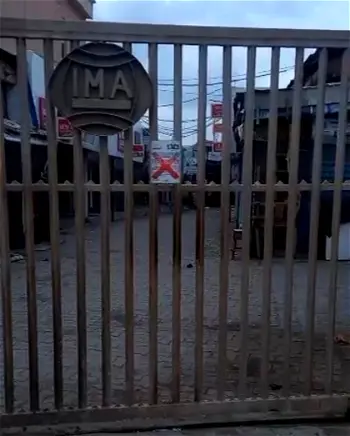Lagos markets closure: A strike against waste management violators or Igbo traders? Nigerians react
Since March this year, after the presidential and governorship election, the Lagos State Government has been sealing several markets across the state for what it termed waste management violation.
The affected markets are mainly populated by Igbo traders, who did not only mobilise en masse in favour of the Labour Party against the ruling All Progressives Congress (APC) in the last election, but also provided their premises as campaign platforms for the opposition.
Recall that presidential candidate of the Labour Party in the February 25 election, Peter Obi, kicked off his Lagos rally from Alaba International Market where he joined supporters in a long procession to Tafawa Balewa Square.
Immediately after the elections, several reports made the rounds that markets dominated by Igbo traders in Lagos Island, Alaba, Ilasamaja, Computer Village were being attacked.
Senior Igbo leaders, including Dr. Uma Eleazu, who is chairman of the Board of Trustees of Anya-Ndi-Igbo, had to lead a delegation to visit elder statesman and chairman of Yoruba socio-cultural group, Pa Ayo Adebanjo, to clarify that there is no battle between the Yoruba and Ndigbo as being insinuated and appealed for the end of all hostilities against Igbo traders.
But in the last few months, the Lagos State Government has begun sealing off markets. Many suspect that the action was a disguised punishment against Igbo traders over their political choice in the last election.
For instance, on September 16, the Lagos State Government, through the Waste Management Authority (LAWMA), shut down the Ladipo and Oyingbo markets over what it described as reckless waste dumping, refusal to pay for waste services, and general poor waste management.
After about three weeks of the closure, the Lagos State Government later reopened the markets on October 9.
The state government had earlier sealed the Mile 12 International Market and Owode Onirin Market along Ikorodu Road for the same offence. But reopened the markets shortly after.
On October 22, the Lagos government sealed the Auto Spare Parts and Machinery Dealers Association (ASPAMDA) market at the Trade Fair area of Lagos.
While the news about the ASPAMDA closure was yet to settle in, the government also descended on Alaba International Market, the largest electronics market in Nigeria with closure.
For many, these actions are no coincidence. Why is the Lagos government resorting to market closure as a way of punishing waste management violators?
On X, formerly Twitter, Nigerians have been baring their minds.
@ChinasaNworu said: “The hatred against Igbo people in Nigeria is permanent . Can you guys tell us what is happening in Alaba and trade fair markets in #Lagos. The Lagos state government has locked those markets to punish you with flimsy excuses to justify their action.”
@EmekaGift100 said: “Igbo traders in Alaba International market came out today as usual for their normal business activities and noticed that their businesses have been sealed by Lagos state government.”
@OnonujuCh said: “Why is Lagos state government locking up markets up and down? Let it not be what am thinking ooh. With all these things happening, I don’t think any reasonable Igbo man will invest outside Igbo land.”
@UFRfestus said: “Could this truly be about sanitation offenses because the Mile 12, Ladipo Alaba and Trade Fair complex are not the only markets in Lagos. Alaba Rago, Iyanoba market etc are, if not the dirtiest. They can never be closed down for sanitation offense. This is more of ethnic war.”








More Stories
Teenager in viral photo of Obi’s 2023 presidential campaign rally, Alabi Quadri languishes in jail
Ribadu tells families of kidnapped victims not to pay any ransom
Ozigbo rejects Anambra APC guber primary, calls it a theft